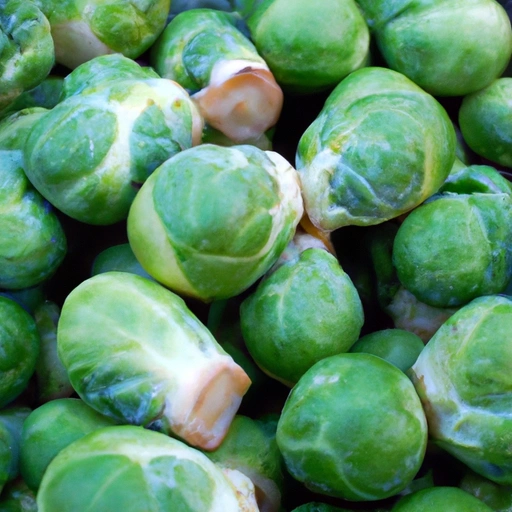Brussels Sprout
Description

Brussels sprouts are small, leafy green vegetables resembling miniature cabbages and are a member of the Brassicaceae family. They grow in clusters on a stalk and are harvested from the bottom of the stalk when they reach about 1 to 1.5 inches (2.5 to 4 cm) in diameter. Brussels sprouts are known for their slightly bitter and nutty flavor, which can become sweeter when cooked properly. They are a staple in winter dishes and are used worldwide in a variety of recipes.
Common uses
Brussels sprouts are commonly served as a side dish, roasted, steamed, boiled, or sautéed. They are also used in salads, slaws, and even as a pizza topping. In recent years, shredded Brussels sprouts have become popular as a healthier alternative to traditional greens in many recipes.
Nutritional value
Calories
A serving of Brussels sprouts, typically 1/2 cup cooked (about 78g), contains approximately 28 calories (117 kJ).
Protein
This serving size offers about 2 grams of protein.
Fat
Brussels sprouts contain a minimal amount of fat, roughly 0.4 grams.
Carbohydrates
They consist of about 6 grams of carbohydrates, of which 2 grams are dietary fiber.
Vitamins
Brussels sprouts are an excellent source of Vitamin C and Vitamin K, and also provide some B vitamins including B6 and folate.
Minerals
Rich in minerals, they contain potassium, phosphorus, and smaller amounts of calcium and magnesium.
Health benefits
The high vitamin content, antioxidants, and fiber in Brussels sprouts contribute to improved digestion, reduced inflammation, and support for heart health. Their nutrients also play a role in maintaining a healthy immune system and bone structure.
Potential risks
In some individuals, Brussels sprouts can cause an increase in gas or bloating due to their high fiber content. People taking blood thinners should also monitor their intake due to the vegetable's high Vitamin K levels, which can affect blood clotting.
Common recipes
Recipes include roasted Brussels sprouts with garlic, Brussels sprout slaw, and creamy gratins. They can also be found in stir-fries, pasta dishes, and as a nutritious addition to omelets.
Cooking methods
Popular cooking methods include roasting to bring out their sweetness, blanching and sautéing for a tender-crisp texture, or shredding raw for salads.
Pairing with other ingredients
They pair well with robust flavors like bacon, nuts, and cheese, as well as with sweet elements such as apples or balsamic vinegar to balance their bitterness.
Summary
Brussels sprouts are a versatile and nutrient-dense vegetable enjoyed around the world. They can be prepared in numerous ways and included in a wide range of dishes, providing both health benefits and delicious flavors.